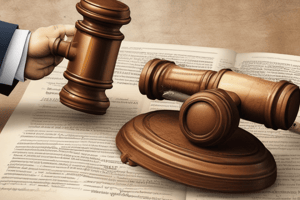Podcast
Questions and Answers
Apa itu hukum konstitusi?
Apa itu hukum konstitusi?
Cabang hukum yang menginterpretasikan dan menerapkan Konstitusi pada isu-isu hukum.
Apa yang ditetapkan oleh Konstitusi Amerika Serikat yang didirikan pada tahun 1787?
Apa yang ditetapkan oleh Konstitusi Amerika Serikat yang didirikan pada tahun 1787?
Kerangka kerja pemerintahan, peran dan tanggung jawab cabang federal, negara bagian, dan lokal, serta hak-hak warga Amerika.
Apa yang ditetapkan oleh Amendemen ke-14 yang diratifikasi pada tahun 1868?
Apa yang ditetapkan oleh Amendemen ke-14 yang diratifikasi pada tahun 1868?
Pengembangan perlindungan hak-hak sipil dan perlindungan yang sama di bawah hukum.
Apa peran Marbury v.Madison (1803) dalam hukum konstitusi?
Apa peran Marbury v.Madison (1803) dalam hukum konstitusi?
Apa yang dimaksud dengan entitas bisnis?
Apa yang dimaksud dengan entitas bisnis?
Apa dua bentuk entitas bisnis yang paling umum?
Apa dua bentuk entitas bisnis yang paling umum?
Apa yang dimaksud dengan korporasi?
Apa yang dimaksud dengan korporasi?
Apa peran pemegang saham dalam sebuah korporasi?
Apa peran pemegang saham dalam sebuah korporasi?
Apa yang dimaksud dengan LLC?
Apa yang dimaksud dengan LLC?
Apa yang dimaksud dengan legal reasoning?
Apa yang dimaksud dengan legal reasoning?
Mengapa legal reasoning merupakan keterampilan kritis dalam profesi hukum?
Mengapa legal reasoning merupakan keterampilan kritis dalam profesi hukum?
Mengapa pemahaman tentang hukum konstitusi, entitas bisnis, dan legalitas penting?
Mengapa pemahaman tentang hukum konstitusi, entitas bisnis, dan legalitas penting?
Study Notes
Law: A Comprehensive Look at Constitutional Law, Business Entities, and Legality
Law is a vast and intricate web that shapes societies, organizations, and individuals. In this article, we'll delve into three interconnected aspects of legal study: constitutional law, business entities, and legality.
Constitutional Law
At the heart of our legal system lies the U.S. Constitution, established in 1787. This foundational document sets the framework for our government, defining the roles and responsibilities of federal, state, and local branches, as well as the inherent rights of American citizens. Constitutional law is the branch of law that interprets and applies the Constitution to legal issues.
Throughout history, constitutional law has evolved to reflect the changing needs and values of American society. Key cases like Marbury v. Madison (1803) established the power of judicial review, allowing courts to determine the constitutionality of laws and government actions. The 14th Amendment, ratified in 1868, expanded protections for civil rights and equal protection under the law. Today, constitutional law continues to evolve as new legal challenges arise and the courts interpret the Constitution's meaning in a modern context.
Business Entity and Legality
Business entities encompass a variety of organizational forms, each with its own set of legal characteristics and requirements. The two most common forms are corporations and limited liability companies (LLCs).
Corporations are independent legal entities created by filing Articles of Incorporation with the state. Shareholders own the corporation and elect a board of directors to oversee management. Corporations are subject to complex legal requirements, such as maintaining corporate records, holding director and shareholder meetings, and filing annual reports with the state.
LLCs are a hybrid form of business entity that combines elements of both corporations and partnerships. LLCs are created by filing Articles of Organization with the state and can be formed by a single individual or multiple members. Like corporations, LLCs provide limited liability protection, meaning members are not personally responsible for the debts and liabilities of the business. However, LLCs also offer more flexibility in terms of management and taxation.
The legality of business entities is governed by state and federal laws, such as the Securities and Exchange Commission's (SEC) regulations regarding the sale and issuance of corporate stock. These laws help ensure fairness in the business environment, protect investors, and promote economic growth.
Legality and Legal Reasoning
Legality refers to the relationship between a particular action or state of affairs and the law. For an action to be considered legal, it must conform to the requirements established by statutes, case law, regulations, and other legal sources.
Legal reasoning is the intellectual process of making legal judgments based on the law. It involves analyzing complex legal issues, researching relevant legal sources, and applying legal principles to reach a conclusion. The goal of legal reasoning is to identify the relevant law, apply it to the facts of the case, and reach a well-reasoned and defensible decision.
Legal reasoning is a critical skill in the legal profession. Lawyers, judges, and other legal professionals use legal reasoning to interpret statutes, analyze case law, and determine the outcome of legal disputes. As with any intellectual discipline, legal reasoning requires discipline, creativity, and critical thinking skills.
Conclusion
Law encompasses a wide range of topics, including constitutional law, business entities, and legality. By understanding these interconnected areas, students, professionals, and laypeople can better navigate the legal landscape and make informed decisions. Whether you're studying law for personal enrichment, pursuing a legal career, or simply seeking to understand your rights and responsibilities, a deeper understanding of these topics can help you make the most of your journey through the legal system.
Studying That Suits You
Use AI to generate personalized quizzes and flashcards to suit your learning preferences.
Description
Explore the foundational concepts of constitutional law, business entities, and legality in this comprehensive look at the interconnections between legal systems. Gain insights into the U.S. Constitution, different forms of business entities like corporations and LLCs, and the importance of legal reasoning in making informed decisions.




